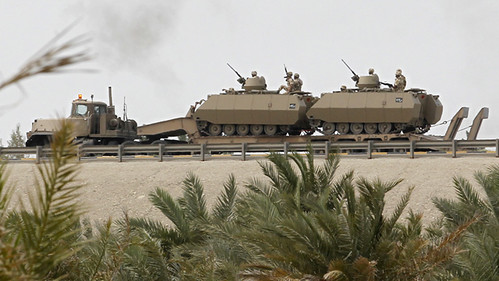
Tanks from the U.S.-backed monarchy in Saudi Arabia crossing over into Bahrain to assist in the suppression of mass demonstrations for reforms. The imperialists have not waged a campaign against the monarchy but have sought regime-change in Libya. a photo by Pan-African News Wire File Photos on Flickr.
Arrests follow deadly Bahrain crackdown
Several opposition figures arrested hours after security forces dispersed pro-democracy protesters from Manama centre
Last Modified: 17 Mar 2011 05:28
Several opposition leaders and activists have been arrested in Bahrain following a violent crackdown on anti-government protests in the tiny Gulf kingdom, reports say.
Among those arrested were Hassan Mushaima, who had returned last month from self-imposed exile to the UK after the Bahraini authorities dropped charges against him, and Ibrahim Sharif, head of the Waad political society, a secular group comprised of mostly Sunni members.
Also taken into custody on Thursday was Abduljalil al-Singace, a leader of the Haq movement, who was jailed last August but was freed in late February as part of concessions by the Khalifa royal family to protesters.
Al Jazeera's correspondent, reporting from the capital Manama, said "a crackdown is under way of the main voices here".
"Significant members of the opposition were arrested overnight, including come prominent activists. Soldiers broke into the houses of these figures early in the morning and made these arrests."
The arrests were made hours after security forces swooped down on the Pearl Roundabout in the centre of the capital and dispersed pro-democracy protesters camped there.
At least six people, including three policemen, were killed and more than 1,000 others injured in clashes that ensued during the assault.
A curfew was imposed in areas of the city following the crackdown.
Heart of protests
The Pearl Roundabout had been the focal point of anti-government protests sweeping Bahrain. Protesters, alleging discrimination and lack of rights, are seeking political reforms in the kingdom.
Wednesday's crackdown came only two days after Saudi Arabia dispatched its troops and a day after a state of emergency was declared in Bahrain to quash the protests.
Hundreds of Saudi-led troops entered Bahrain on Monday as part of a Gulf Co-operation Council (GCC) initiative to help protect government facilities there.
The crackdown drew international criticism, with Hillary Clinton, the US secretary of state, warning that Bahrain and its GCC allies were "on the wrong track".
Neighbouring Iran and Iraq also condemned the violence.
Nouri al-Maliki, the Iraqi prime minister, spoke out against the military intervention while Grand Ayotollah Ali al-Sistani, Iraq's top-ranked Shia cleric, called on Bahraini authorities to "stop using violence against unarmed citizens", Hamed al-Khafaf, his spokesman, said.
Police crackdown
An Al Jazeera correspondent, reporting from Manama, said police, backed by the military, attacked the protesters early on Wednesday from all sides and used tear gas canisters to disperse the crowd.
Protesters, intimidated by the numbers of security forces, retreated from the roundabout, he said. By 5pm the area was quiet, although a few people remained on the streets. A helicopter circled overhead.
Doctors and witnesses at the city's main Salmaniya hospital told Al Jazeera that they had been "besieged" by security forces.
"We are besieged here since the morning. No one can get in or out of the hospital as a result of the conflict at the Roundabout. Bahraini army, police and Saudi security are using tanks to prevent people from entering," Abdul Mohamed, an eyewitness, told Al Jazeera.
Dr Nehad Shirawi, the head of the intensive care unit at the hospital told Al Jazeera via telephone: "We are scared to get out of the hospital. We don't think it's safe to go out and we don't know what to do."
Source: Al Jazeera and agencies
No comments:
Post a Comment